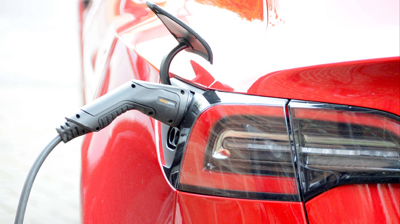
Britain’s millionth battery electric car (BEV) reached the road in January 2024, according to the latest figures from the Society of Motor Manufacturers and Traders (SMMT), while the new car market grew 8.2% for the month, continuing to be driven by fleet and business sales.
The first month of the year saw 142,876 new cars registered, an uplift of 10,882 units on January 2023, the best performance for the month since 2020 and the 18th consecutive month of growth.
The increase was driven entirely by the fleet market, which rose by 29.9%, while private retail uptake fell -15.8%. Fleets accounted for more than six in 10 (63.2%) new cars registered, up from just over half (52.7%) last year.
The market also – narrowly – reached its anticipated milestone of a million BEV registrations since records began. Some 20,935 BEVs were registered in January, a rise of 21.0% year on year, taking the overall total since 2002 to 1,001,677 – testament to the commitment of manufacturers to deliver ever-increasing numbers of zero emission models.
BEV market share for January also grew year on year to 14.7%, although this is below the full 2023 performance of 16.5%. Plug-in hybrids (PHEVs) recorded volume growth of 31.1% to take 8.4% of the market, while hybrid (HEV) volumes fell -1.2% with a 13.1% share.
Volatility in BEV supply has been expected and is likely to continue as manufacturers adjust product allocation following the last-minute resolution over UK-EU rules of origin, which had threatened to apply tariffs to EVs, restricting affordability. However, while fleet and business demand for BEVs grew by 41.7% in January, registrations by private buyers fell by -25.1% – an ongoing trend that will undermine Britain’s ability to deliver net zero.
The UK is now the only major market to combine a 2035 end of sale date with a mandated zero emission vehicle market share, but without any significant consumer incentives. Yet it is increasingly clear that private buyers need more support to switch.
Ahead of next month’s Budget, the industry is calling for government to support consumers by temporarily halving VAT on new BEV purchases. Such a step would cost the Treasury an average of just £1,125 per car, which is less than the cost of the previous Plug-in Car Grant and would put more than a quarter of a million electric – rather than petrol or diesel – cars on the road by the end of 2026, on top of those already expected. Not only would this cut CO2 by more than five million tonnes during that time, it would mean that the next million EVs could be delivered in just two years.
Temporarily reducing VAT on EVs would partly mirror the tax exemption already offered to consumers on other carbon reduction technologies such as heat pumps. Supporting the EV consumer today would also ensure wider benefits such as increasing the supply of used EVs, enlarging the overall market to make it more attractive for charging and manufacturing investment, and slashing Britain’s carbon footprint.

Mike Hawes (pictured above), SMMT Chief Executive, said, “It’s taken just over 20 years to reach our million EV milestone – but with the right policies, we can double down on that success in just another two.
“Market growth is currently dependent on businesses and fleets. Government must therefore use the upcoming Budget to support private EV buyers, temporarily halving VAT to cut carbon, drive economic growth and help everyone make the switch. Manufacturers have been asked to supply the vehicles, we now ask government to help consumers buy the vehicles on which net zero depends.”






